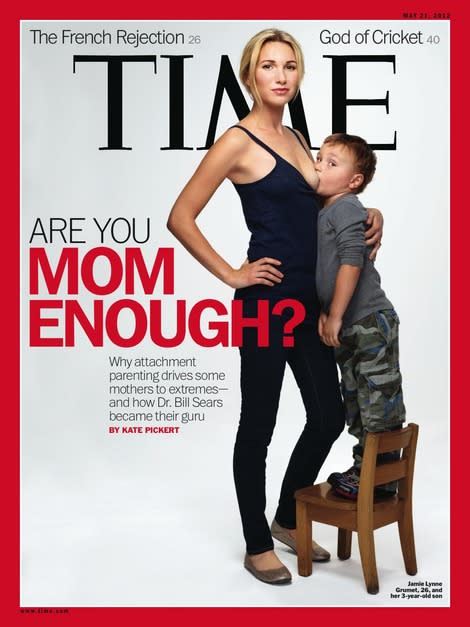Breastfeeding: How Old is Too Old?

Time magazine's most recent cover is giving people something to talk about. The photo pictures a 20-something blond mom breastfeeding her 3-year-old son as he stands on a chair. The Los Angeles-based mom says she was breastfed by her own mother until the age of 6.
In America, this photo seems shocking to us because it is a sight so rarely seen in our culture-and because the image of a kid standing on a chair to breastfeed is, well, probably not realistic. However, worldwide children are commonly breastfed well into their toddler years. According to UNICEF, more than half of mothers worldwide are still breastfeeding their children at 20-23 months. In Asia it's 69 percent and South Asia 76 percent, according to their numbers.
According to the Centers for Disease Control and Prevention, 23.8 percent of moms in the United States are still breastfeeding at 12 months, with California being the highest in prevalence at 40 percent of moms and Louisiana the lowest at 7 percent.
Through her extensive research on breastfeeding, Dr. Katherine A. Dettwyler, anthropology professor at the University of Delaware in Newark, Delaware, found the average age of natural weaning ranges from 2½ to 7 years old.
The doctor featured in Time's article on attachment parenting, Dr. Bill Sears, says in his bestselling The Baby Book, "It is not the mother who weans the baby, but the baby who weans from the mother." He says, "The most secure, independent and happy children we have seen are those who have not been weaned before their time."
There is little research on the benefits or drawbacks on breastfeeding past the age of 2. Perhaps that is why the various organizations stay away from offering the upper limits of a recommended age for breastfeeding. The World Health Organization recommends exclusive breastfeeding for up to 6 months of age, with continued breastfeeding along with appropriate complementary foods up to 2 years of age or beyond. The American Academy of Pediatrics recommends exclusive breastfeeding for six months and continued breastfeeding for a minimum of one year.
It can't be ignored that the average paid maternity leave in the United States is much lower than in most other developed countries, leaving less time for extended breastfeeding. Whatever the case, breastfeeding provides a healthful beginning for newborns by providing an important source of antibodies to protect against disease as your baby's own immune system develops during the first year.
That being said, for mom's who can't breastfeed or choose not to, they can also raise healthy and happy babies with the right knowledge of proper nutrition.
What do you think: Does the Time magazine cover portray a negative image of breastfeeding? Or do you think it is a positive force in encouraging American moms to breastfeed longer by desensitizing the image?
